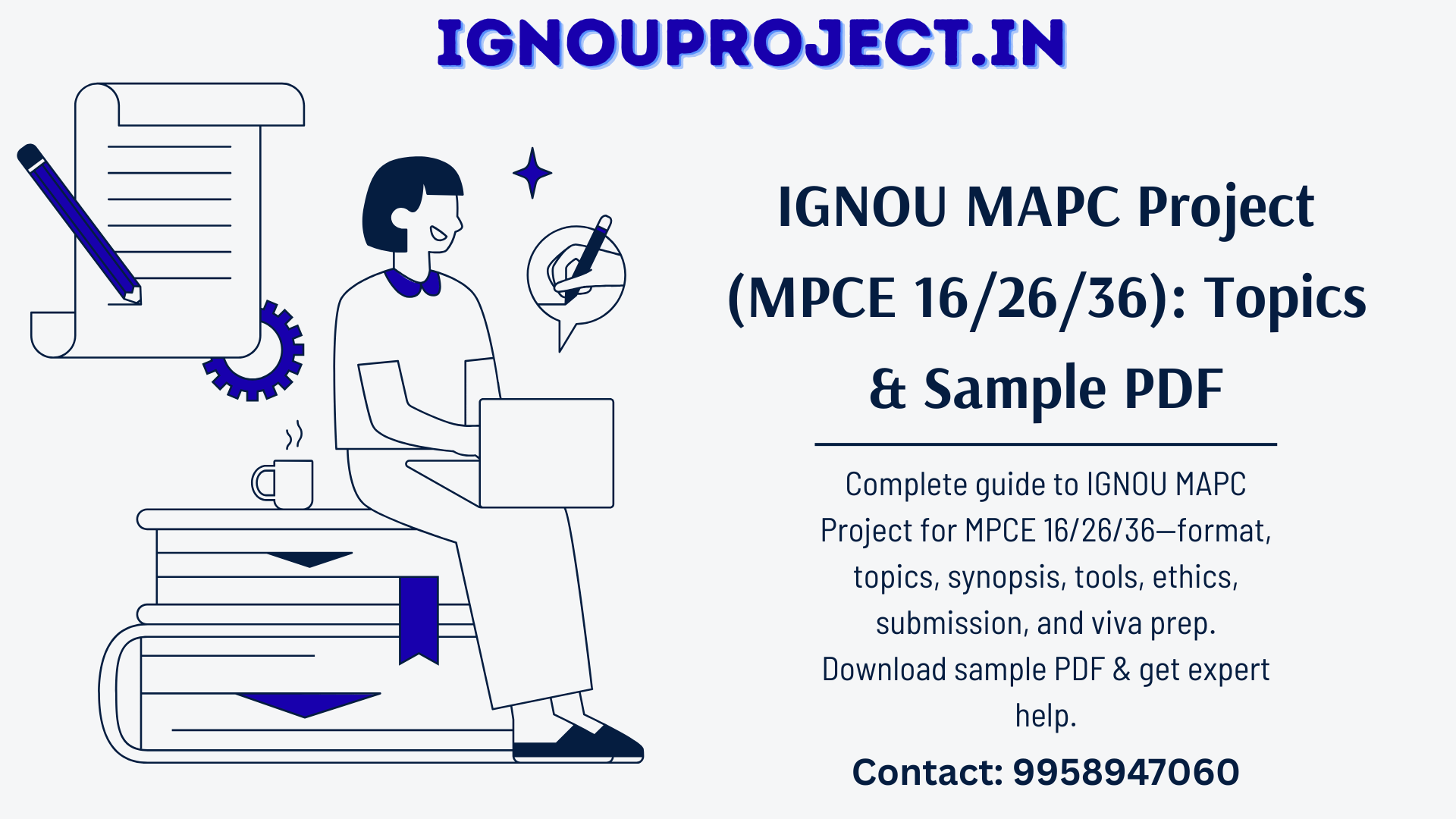The IGNOU MAPC Project for MPCE 16/26/36 is the programme’s capstone, designed to demonstrate research competence in Counselling, Clinical, or Organizational/Industrial Psychology. Students apply theory to a defined problem, follow ethical procedures, and produce a structured report that evidences methodological rigour and practical relevance.
The MAPC project typically includes a synopsis, data collection using validated tools, statistical analysis, and a viva-voce. When executed well, it builds core skills in problem definition, literature synthesis, research design, analysis, and APA-style reporting—preparing graduates for advanced study and professional practice.
Key Highlights & Quick Summary
- Project as capstone – IGNOU’s MA Psychology programme requires students to complete a 6‑credit project under MPCE‑016 (Counselling), MPCE‑026 (Clinical) or MPCE‑036 (Organizational/Industrial). Each project involves about 180 hours of independent research and contributes 100 marks – 70 marks for the written report and 30 marks for a viva voce. Passing requires at least 40 % overall.
- Chapter-wise structure – The dissertation is typically around 100 pages and follows a prescribed format: title page, certificates, acknowledgements, abstract (150–250 words), five core chapters (introduction, literature review, methodology, data analysis & results, discussion), followed by conclusion, implications, limitations, references (APA 7th) and annexures. The synopsis (proposal) is a shorter document (15–20 pages) outlining objectives, hypotheses, methods and ethical safeguards.
- Synopsis approval precedes research – Learners must submit a synopsis detailing the problem, variables, sampling and tools. IGNOU requires completion of MPC‑005 (Research Methods) and MPC‑006 (Statistics) before submitting the synopsis. Only after receiving approval should data collection start.
- Ethics and permissions – Projects must adhere to ethical principles such as minimal risk, informed consent, confidentiality, privacy and proper debriefing. Sensitive populations require extra caution and necessary referrals.
- Submission windows – IGNOU generally accepts project reports from 1 July to 15 August for learners in the July cycle and from 1 January to 15 February for the January cycle; dissertations must be submitted by 31 May (July batch) or 30 November (January batch). Learners must check the latest Regional Centre (RC) or Student Evaluation Division (SED) circulars because deadlines can change.
- Viva preparation – After submission, students appear for a viva voce at their RC. Questions typically cover rationale, literature justification, methodology, data analysis, findings and ethical issues.
Table of contents
What Is the IGNOU MAPC Project (MPCE 16/26/36)?
Specialization Overview: Counselling (MPCE‑016), Clinical (MPCE‑026), Organizational/IO (MPCE‑036)
The Master of Arts in Psychology (MAPC) at the Indira Gandhi National Open University lets learners specialize in one of three domains during their second year:
- Counselling Psychology (MPCE‑016) – focuses on understanding individuals’ emotional and behavioural challenges and developing interventions to enhance well‑being. Projects often examine coping strategies, stress management, self‑esteem or family dynamics. Approaches may draw on humanistic, cognitive–behavioural and positive psychology models.
- Clinical Psychology (MPCE‑026) – addresses psychopathology, diagnosis and therapeutic interventions. Projects typically investigate symptoms of anxiety, depression, substance use or other mental disorders, and may explore the efficacy of therapies or psychosocial factors influencing symptomatology.
- Organizational/Industrial Psychology (MPCE‑036) – explores human behaviour in workplaces. Projects may analyse job satisfaction, motivation, leadership, occupational stress, work–life balance or organizational commitment.
Learning Outcomes & Evaluation Weightage (high‑level)
The MAPC project module develops independent research skills, ethical awareness and evidence‑based reasoning. Learners must formulate clear questions, review relevant literature, design and conduct ethical studies, analyse data appropriately and interpret findings in context. It carries 100 marks—70 for the report and 30 for the viva. To pass, students need at least 40 % overall and should invest about 180 hours of work (equivalent to 6 credits).
Chapter‑Wise IGNOU MAPC Project Format
The dissertation has a clear structure to facilitate readability. Regional Centres may adjust word counts, but the following overview illustrates the essential components:
- Front matter – Cover page with project details (title, code, enrolment number, centre), supervisor’s certificate, learner declaration and acknowledgements.
- Abstract – A 150–250-word summary of objectives, methods, main findings and implications. Keep it self‑contained; confirm current word limits with your RC.
- Chapter 1: Introduction – Present the problem, justify its significance, define key terms and state objectives and hypotheses or research questions.
- Chapter 2: Literature review – Synthesize previous research thematically, critique gaps and outline theoretical frameworks that guide your study.
- Chapter 3: Methodology – Describe design, sample characteristics, instruments, procedure and ethical safeguards. Provide just enough detail for replication.
- Chapter 4: Results – Describe data cleaning and analysis, report descriptive and inferential statistics with tables or charts, and indicate p‑values and effect sizes.
- Chapter 5: Discussion – Interpret results in relation to literature, highlight implications, acknowledge limitations and suggest future research.
- References and Annexures – List all sources in APA 7th style and append instruments, consent forms or raw data tables. Typical dissertations run about 100 pages, but follow the latest RC instructions.
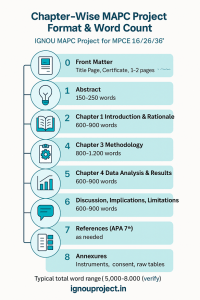
Figure: Chapter-Wise MAPC Project Format & Word Count
IGNOU MAPC Synopsis (Proposal) Writing – Step‑by‑Step
Before collecting data, learners must submit and obtain approval for a synopsis detailing the proposed study. IGNOU’s handbook recommends 15–20 typed pages with 1.5 line spacing. A well‑crafted synopsis increases the chances of approval and sets the foundation for the dissertation.
Problem Statement & Objectives
Provide a concise problem statement describing the psychological issue and context. Follow with a few objectives that are specific, measurable and aligned with your specialization; avoid extensive explanations or examples.
Variables/Constructs & Hypotheses/Research Questions
Briefly describe the key variables in your study and how you plan to measure them. Define the constructs operationally and state whether you will test formal hypotheses or explore descriptive research questions.
Tools/Scales Selection (validity/reliability note)
Select standardised instruments that match your constructs. Keep the description concise—list the name of each scale (e.g., BDI, PSS, HAM‑A, PHQ‑9, job satisfaction surveys) and confirm that you have checked reliability, validity and licensing requirements.
Sampling & Inclusion Criteria
Outline your sampling strategy (e.g., purposive or convenience) and briefly specify who will be included or excluded. Provide a ballpark sample size based on similar studies, and list demographic variables you intend to collect.
Procedure, Timeline & Expected Outcomes
Summarise the procedure—permissions, recruitment, data collection, debriefing—and propose a realistic timeline for each stage. Mention expected outcomes in one sentence and attach draft tools and consent forms as annexures.
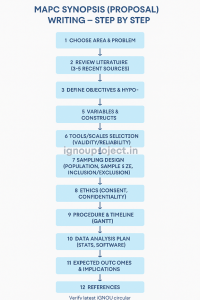
Figure: MAPC Synopsis (Proposal) Writing – Step by Step
Learn how to write an IGNOU MAPC Synopsis
Ethics & Permissions in IGNOU MA Psychology Research
Research must comply with the APA ethical code. Key principles include:
- Informed consent – Provide an information sheet and obtain written consent before data collection. Participation must be voluntary.
- Confidentiality – Use codes instead of names, store data securely and remove identifying details from the report.
- Vulnerable participants – Obtain extra approvals and guardian consent when working with children or clinical populations, and be ready to refer distressed participants to appropriate services.
- Data management – Securely store and later destroy data, anonymise transcripts and respect participants’ right to withdraw without penalty.
- Deception and debriefing – Avoid deception; if necessary, debrief participants thoroughly after participation.
Choosing the Right Tools in MAPC Research (By Specialization)
Select brief, reliable tools that align with your variables and population. Keep instrument descriptions concise and ensure you have permission to use them.
MPCE‑016 (Counselling)
Common choices include: BDI for depressive symptoms, BAI for anxiety, Perceived Stress Scale for stress, Rosenberg Self‑Esteem Scale, and COPE/CISS for coping styles. Each has established reliability; consult manuals for use.
MPCE‑026 (Clinical)
Frequently used measures are: clinician‑rated HAM‑A or HAM‑D, self‑report scales like SCL‑90‑R, PHQ‑9 and GAD‑7, and disorder‑specific instruments such as Y‑BOCS. Ensure training and licensing where required.
MPCE‑036 (Organizational)
Popular instruments include Job Satisfaction Surveys (JSS/MSQ), Work Motivation scales (e.g., WEIMS), Organizational Commitment questionnaires, Maslach Burnout Inventory, and Work–Life Balance measures. Select versions validated for your context and check usage rights.
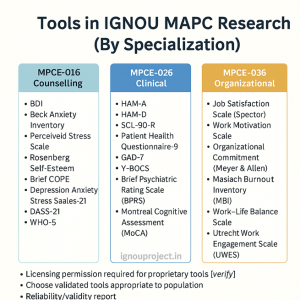
Figure: Tools in IGNOU MAPC Research (By Specialization)
Caution: Many scales are proprietary. Verify licensing and translation permissions and report reliability and validity in your population.
Trending 45 IGNOU MAPC Project Topic Ideas (Curated Lists)
Topic selection should align with your specialization, theoretical interest and feasibility. Below are curated themes reflecting recent trends in psychology research. Tailor them to specific populations or contexts.
15 Topics for IGNOU MA Counselling Psychology Project (MPCE‑016)
- Academic procrastination & CBT intervention
- Self‑compassion and caregiver resilience
- Mindfulness, stress and self‑esteem
- Social media use & body image
- Coping strategies: exam vs job stress
- Emotional intelligence & adolescent aggression
- Internet addiction counselling effectiveness
- Family functioning in fertility treatment
- Gratitude journaling and optimism
- Career counselling for rural youth
- Bullying victimisation and self‑esteem
- Yoga/pranayama for healthcare workers
- Cultural humility in counselling
- Spirituality and grief coping
- Psychoeducation to reduce stigma
15 Topics for IGNOU MA Clinical Psychology Project (MPCE‑026)
- Post‑COVID anxiety & depression prevalence
- Cognitive distortions & suicidality
- Tele‑therapy vs face‑to‑face therapy
- Emotion regulation in conduct disorder
- Childhood trauma & eating disorders
- Mindfulness‑based therapy for bipolar
- Caregiver burden in schizophrenia
- OCD vs GAD psychosocial functioning
- Stigma & help‑seeking in students
- Substance use & impulsivity
- Sleep quality and anxiety severity
- Alexithymia in borderline disorder
- Coping after intimate partner violence
- Cognitive deficits in cannabis users
- Expressed emotion & schizophrenia relapse
15 Topics for IGNOU MA Organizational/IO Psychology Project (MPCE‑036)
- Remote work: satisfaction & burnout
- Psychological safety & innovation
- Diversity training & inclusion attitudes
- Emotional intelligence & leadership
- Organisational support & engagement
- Work–life boundary management stress
- Gender differences in leadership
- Corporate social responsibility & turnover
- Job crafting & engagement
- Gig work & well‑being
- Occupational stress & nurse coping
- Contract breach & citizenship behaviour
- Leadership styles & motivation
- Mindfulness programmes for burnout
- Workplace bullying & mental health
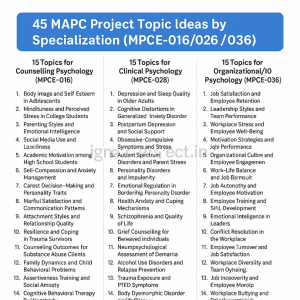
Figure: 45 MAPC Project Topic Ideas by Specialization (MPCE-016/026/036)
Data Analysis in IGNOU MAPC Project Research
Data analysis should align with your research design. After coding and cleaning data, report descriptive statistics (means, standard deviations, frequencies) to summarise sample characteristics. Choose inferential tests based on your questions—t‑tests or ANOVAs for group differences, correlations or regressions for relationships, and non‑parametric alternatives when assumptions are violated. Present results with clear tables or charts following APA style, include exact p‑values and effect sizes, and interpret findings cautiously.
IGNOU MAPC Project Submission & Deadlines (Jan vs July Cycle)
Process and Deadlines
Projects move through five phases: synopsis approval, data collection, drafting, binding and final submission. Typically, January‑batch students submit between 1 January and 15 February, while July‑batch students submit between 1 July and 15 August. Actual deadlines may shift, so follow your RC’s latest circular. Submission requires the bound report, approval letters and fee receipts.
Avoiding Rejection
Common pitfalls include poorly structured proposals, inadequate ethical safeguards, use of unlicensed instruments, non‑adherence to format and plagiarism. Address these issues by following RC guidelines closely, obtaining necessary permissions and submitting original work.
Viva‑Voce Preparation in MAPC Project
Following submission and payment of the exam fee, learners attend a viva voce (in person or online). Examiners assess your grasp of the topic, methodology and results. Prepare by reviewing your report, understanding why specific methods and statistics were used, anticipating typical questions (topic selection, sample, tools, challenges, contributions and limitations), demonstrating ethical awareness and presenting yourself professionally.
Downloadable Resources
Learners can access official resources on the IGNOU website or Regional Centre portals:
- IGNOU MAPC Project Guidelines / Handbook
- IGNOU MAPC Project Synopsis Sample PDF
- IGNOU MA Psychology Project Sample PDF
- IGNOU MAPC Project Topic List
FAQs – IGNOU MAPC Project for MPCE 16/26/36
When can I submit my IGNOU MAPC project?
For the January batch, dissertation submission usually occurs between 1 January and 15 February; for the July batch, between 1 July and 15 August. Verify dates with your Regional Centre.
What is the minimum passing mark for the MA Psychology Project?
You must secure at least 40 % overall; the project report carries 70 marks and the viva voce 30 marks.
How long should the MAPC project report be?
IGNOU recommends around 100 pages typed double‑spaced. Word limits may vary by RC.
How long should the MAPC synopsis be?
The synopsis is usually 15–20 pages with Times New Roman 12‑point font and 1.5 spacing.
Can I start data collection before my MAPC synopsis is approved?
No. You must wait for official approval before collecting data; otherwise, the project may be invalidated.
Which tools are recommended in MA Psychology Project Research?
Choose standardised instruments relevant to your variables and specialization, such as BDI, PSS, HAM‑A/HAM‑D or job satisfaction scales. Check licensing requirements.
Do I need ethical approval for my MA Psychology Project work?
Yes. Prepare informed consent forms, confidentiality procedures and, if necessary, obtain approval from institutional or local ethics committees. Ignoring ethics could lead to rejection.
What happens if my MA Psychology Project is rejected?
If the project or viva is failed, there is no re‑evaluation. You must re‑register and restart the process from synopsis submission.
Conclusion
The IGNOU MAPC project under MPCE‑016, MPCE‑026 and MPCE‑036 is more than a final assignment—it is an opportunity to apply theoretical learning to real‑world psychological issues. A successful project demands careful planning, ethical mindfulness and rigorous data analysis. This guide has outlined the prescribed format, synopsis preparation, ethical considerations, tool selection, topic ideas, data analysis strategies, submission timelines and viva preparation, based on official IGNOU’s Project guidelines.
While general principles remain constant, always refer to current IGNOU circulars for updates and consult your supervisor regularly. By following these recommendations, learners can complete their MAPC projects confidently, contribute meaningfully to the field of psychology and meet IGNOU’s academic standards.
👉 To learn more about project writing in MAPC (MA in Psychology), check out our blog:
Need Help in IGNOU MAPC Project (MPCE‑016/026/036)?
Completing the IGNOU MAPC project is a demanding yet rewarding journey. By thoughtfully selecting a topic, crafting a clear synopsis, adhering to ethical guidelines and employing robust methodology, you can produce a dissertation that not only satisfies academic requirements but also contributes to psychological knowledge.
Start early, maintain close communication with your supervisor and consult the latest Regional Centre circulars for updates. With diligence and curiosity, your MPCE‑016/026/036 project can serve as a springboard for further research or professional practice.
Get expert assistance, topic suggestions, and ready-to-submit project reports now!
👉 [Contact Us] | 🌐 Visit: ignouproject.in

